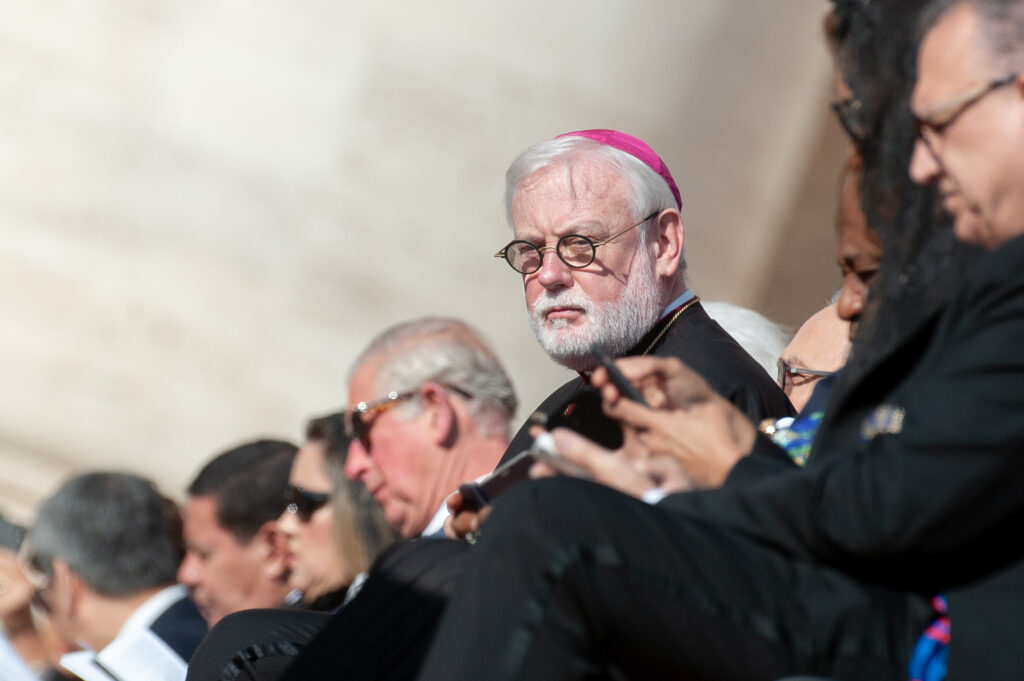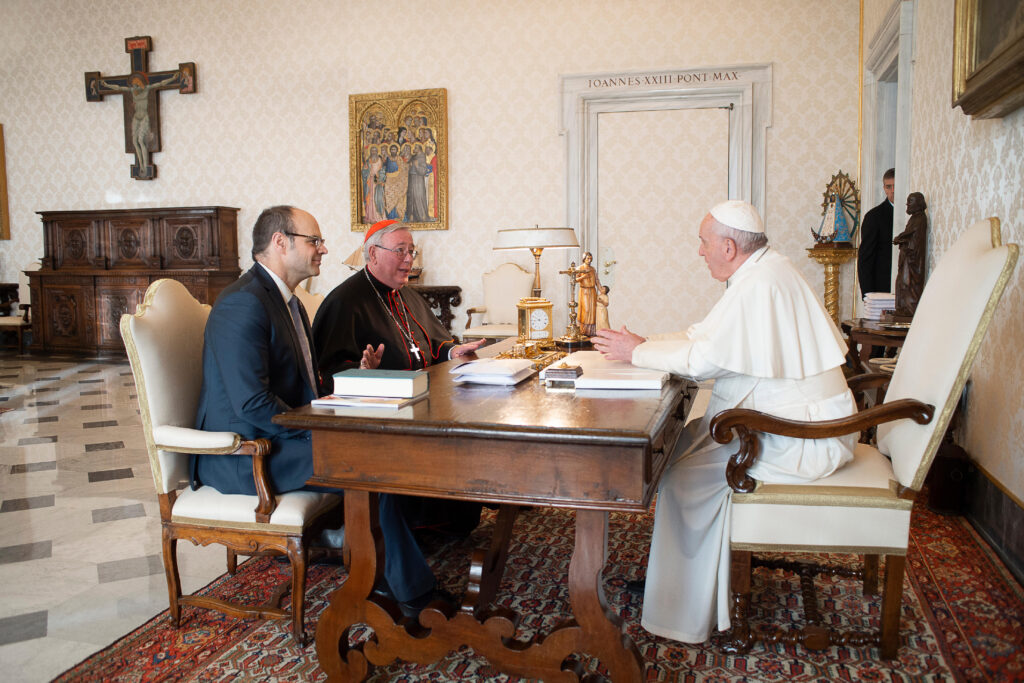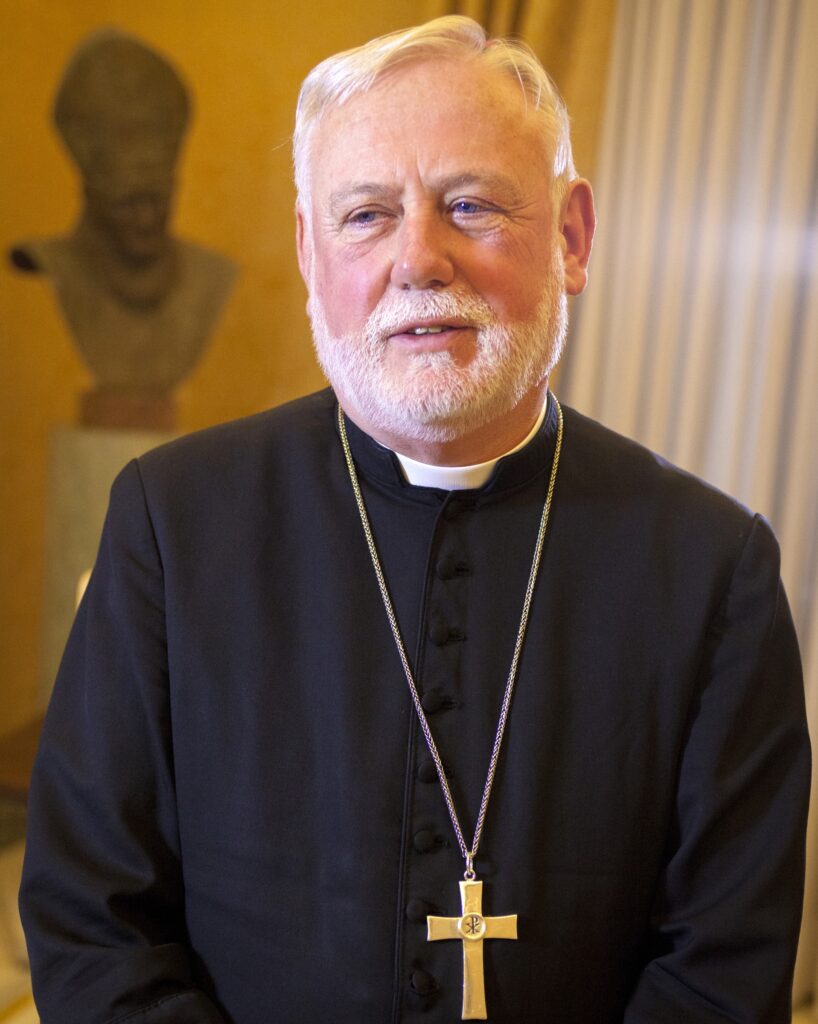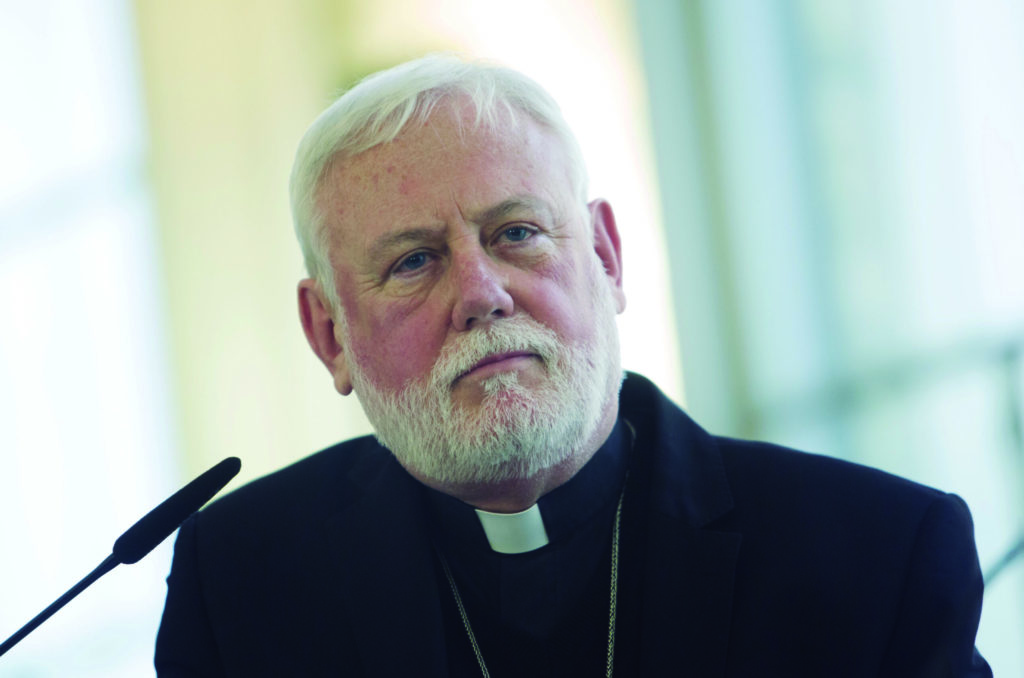 "I dream of a Europe where the person is a value in itself."
"I dream of a Europe where the person is a value in itself." Bishop Celestino Aós: "It is time to build a Latin America of greater solidarity".
Bishop Celestino Aós: "It is time to build a Latin America of greater solidarity". Solidarity, the key after the pandemic. Fratelli tutti's proposal
Solidarity, the key after the pandemic. Fratelli tutti's proposalFrom the "identity" of the Old Continent to the 70th anniversary of the European Convention on Human Rights, passing through the contribution of the Holy See within the international community. Without omitting to speak of the limits of individualism, the heated debate on the subject of migration with suggestions on the necessary collaboration between States, and finally the safeguarding of religious worship in times of pandemic, which has led to limiting its exercise in some way. The Secretary for Relations with the States of the Holy See, Archbishop Paul Richard Gallagher, interviewed by OmnesThe Church's point of view on these issues of profound relevance in Europe.
"European identity".
Your Excellency, if we want to summarize in a few lines the "European identity", often at the center of many discussions, what elements should be highlighted?
I believe that the Pope Francis’who has devoted several speeches to Europe, has highlighted well the features that characterize the European identity, based essentially on the principle of the centrality of the person. Europe loses its soul, and therefore its identity, if it becomes a set of procedures or is limited to purely economic considerations. On the contrary, starting from the individual, Europe rediscovers that it is first and foremost a community.. This is, in fact, the key word on which the European project has focused, inspired, among other things, by the Schuman Declarationwhose 70th anniversary we have commemorated this year..
The rediscovery of the fact of being a community is even more urgent in the context of the current pandemic, where the temptation to act autonomously is stronger, while it becomes more evident that only together, in a spirit of solidarity, can we face the challenges that the moment presents us. Mutual respect and the capacity for dialogue also mature in the life of a community. These are the fundamental principles, within which respect for and promotion of human rights, which are the lowest common denominator of modern Europe, do not remain a mere abstract concept or a good intention, but acquire a concrete physiognomy, respectful of the identity and contribution of each individual.

In this sense, how important is it today to rediscover the true meaning of "rights" in a multicultural society?
The European Convention on Human Rights was signed two years after the Universal Convention on Human Rights and refers to what are precisely the universal rights recognized therein. It is important to remember the universal dimension of human rights.precisely because they must be guaranteed to every human person, man or woman, at every stage of his or her existence and in every country. The recognition of human rights corresponds to an anthropological requirement of human nature that transcends individual cultures. I believe that the celebration of the seventieth anniversary of the European Convention on Human Rights could provide an opportunity to rediscovering that dimension of universality that underlies the meaning of human rights.
What specific contribution, in fact, does the Holy See offer within the European international community and under what title does it do so?
The contribution of the Holy See within the international community, both European and non-European, is always that of awaken his consciousness in some way. He does so in light of his spiritual mission. As Pope Francis reminds us, we, as Christians, are not called to occupy spaces, but to initiate processes. It is not, therefore, a matter of reclaiming spaces of power, animated by nostalgia for the past. On the contrary, the Holy See offers its contribution so that those with political responsibilities can act concretely to promote the common good, safeguarding above all the dignity of the human person.
In this perspective, therefore, are the Pope Francis' appeals on behalf of migrants, as well as on behalf of the poor, the unemployed and the marginalized in general.. The Pope's recent warnings to Europe and the whole world in this time of pandemic should also be read in the same direction, recalling that this is not a time of indifference, selfishness and division, but a good opportunity to recognize each other as part of a single family and, therefore, to support each other in a spirit of solidarity.

How can we rediscover the need to anchor the ethical foundation "in the objectivity of nature" rather than in "the subjectivity of the individual" or, worse, in the mainstream?
In ideologies inspired by an agnostic and atheistic humanism, the idea that man is, in himself, the beginning and the end of everything is insisted upon. Individual freedom is exalted in such a way that the subjectivity of the individual sometimes takes over the objectivity of nature received as a gift. When the man of postmodernity believes that he can subject society and laws to his own will and desires, he ends up submitting to the mainstream, which can take on different connotations, from hedonistic drift to the denial of the very existence of a "nature". There is, instead, a great need to rediscover the objectivity of human nature also in the light of the relational and social dimension, which is equally essential to our human civilization and which makes us "naturally connected" to one another.
Immigration
Another issue where the debate is very heated and where confrontations are increasingly frequent is migration, where there is often a deliberate lack of cooperation between Member States. What is your view on this phenomenon?
Currently, there is a increasing pressure on the countries of the eastern Mediterranean and the western Balkanswhere many migrants try to move from Greece and Bulgaria to northern European countries after leaving Turkey. However, the International Organization for Migration (IOM) confirms that most of the migrants have entered Europe by sea. Almost half of all arrivals were in Greece via Turkey, and then in Italy and Malta via Libya and North Africa in general. Lately, Spain has also seen an increase of more than 1,000% in arrivals to the Canary Islands archipelago, where some 17,000 migrants arrived this year.. Overall, we are not at the 2015 level, but with continued conflict and the effects of the pandemic, the numbers may continue to rise.
Until now, the onus has been on the "first-arrival" countries, creating a situation that has proved unsustainable and has led to clear violations of the principle of non-refoulement and human rights, with avoidable deaths at sea and torture in detention camps, especially in third countries such as Libya. Two measures are needed to promote solidarity among the states of the European Union: 1) a common mechanism for equitable burden sharing in the reception of migrants or refugees and the processing of asylum applications; 2) a common agreement on search and rescue (SAR) - search and rescue - at sea, as well as a common mechanism for disembarkation and return.
For this purpose, the Holy See awaits with interest the negotiation of the new European Union Pact on Migration and Asylum.. However, it must be said that concrete policies and mechanisms will not work unless they are backed by the necessary political will, as well as by the commitment of all stakeholders to genuine solidarity and the common good.
Without an agreed effort to end conflict and address development in countries of origin, no system will be sufficient. On the other hand, the goal of any system must always be to make migration safer, orderly, regular and voluntary. As the Holy See has always maintained, everyone has the right to life, liberty and security of person, which implies above all the possibility of having a dignified life, in peace and tranquility, in their own homeland.
A path of peace between religions
In February 2019, the Document on Human Fraternity for World Peace and Common Coexistence What has happened with this initiative and what progress has been made? Someone said they were concerned about an alleged loss of Christian identity in the opening to other religious denominations?
The signing of the Document on Human Fraternity is not an invitation to "lose one's identity". On the contrary, it is rather the encouragement to deepen the prospect of drawing closer to those who belong to a different religion. As Pope Francis observes in the encyclical Fratelli tutti: "A path of peace is possible between religions. The starting point must be God. As believers we are challenged to return to our sources in order to focus on what is essential: [...] the sincere and humble worship of God.The "love of life" that leads to respect for the sacredness of life, for the dignity and freedom of others, and to loving commitment to the well-being of all (cf. 282-283).

The Document on Human Fraternity is, therefore, a fundamental instrument for moving from simple tolerance to a true collaboration among the faithful of different religions committed to the promotion of peaceful coexistence. Basically, it is the recognition of a change of perspective, which has led the Holy Father and the Grand Imam to reflect on the meaning of the concept of "citizenship", i.e., that we are all brothers and sisters and therefore we are all citizens with equal rights and duties..
Among its fruits, the document inspired the creation of the Senior Committee to achieve the objectives of the Document on Human Fraternity. The Committee, which includes members from the United Arab Emirates, Spain, Italy, Egypt, the United States and Bulgaria, is chaired by Cardinal Miguel Angel Ayuso Guixot, President of the Pontifical Council for Interreligious Dialogue. Among the Committee's initiatives, I would especially mention the construction of the Abrahamic Family House in Abu Dhabi, which would include a mosque, a Catholic church and a synagogue.and the creation of the Human Fraternity Award.
Religious freedom in times of pandemic
The health emergency linked to the coronavirus has also reopened the debate on religion and religious freedom, as some governments have suspended the celebration of Masses with the people as a precautionary measure. What is your opinion on this?
The emergence of the pandemic, which unfortunately is still in full swing in many countries, has led governments to adopt measures that restrict fundamental freedoms, including freedom of worship. It is clear that this has led to the suffering of the faithful who still in many places have not been able to gather in churches for the Eucharist. The impossibility of celebrating funerals has been and is felt with particular pain.
The episcopates in general have reacted in a way that I consider prudent and responsible, namely, by inviting the faithful to abide by the government's instructions. At a time when everyone was called upon to sacrifice part of their freedom, Christians wanted to be in solidarity with their brothers and sisters; to this end they temporarily gave up one aspect of religious freedomas is the exercise of public worship, but in this form took advantage of the opportunity to emphasize other aspects of the faith, starting with the need for personal prayer..
Therefore, it was a difficult resignation, animated by a spirit of responsibility. When the sanitary emergency is definitively over, which we all hope will be as soon as possible, the Churches of the different countries will be able to evaluate the situation, whether the restrictions on the freedom of community worship decided by the public authorities to combat the spread of the virus have been adopted in a framework of full legalityor if unjustified violations of rights have been committed in the name of public health.
I note that the attitude of the episcopates towards governmental provisions, as described above, has also been followed by the other Christian churches and denominations and the major religious denominations. I believe that the prevalence of collaborative attitudes towards institutions is evidence of a mature awareness of their true role in society, rather than of weakness.. The convergence of religious denominations towards this attitude of solidarity, constructiveness and closeness to people in its concrete form is probably one of the most positive notes to be found among the many effects that this epidemic has had.











